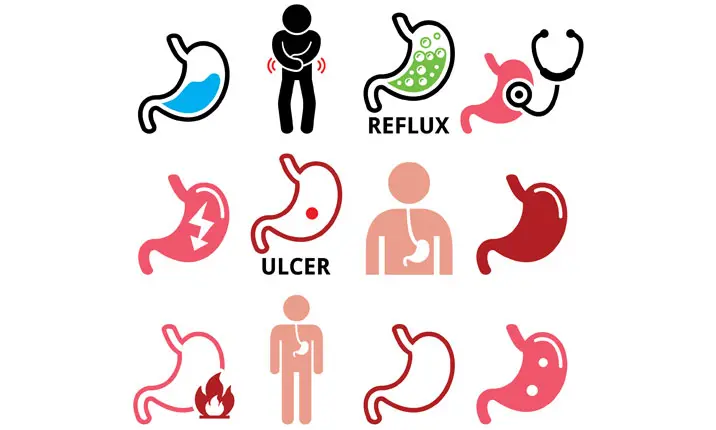Stomach discomfort is a common problem affecting many people with an estimate of 1 in 5 people experiencing this problem.
Stomach discomfort can greatly impair your quality of life and flare up when you least expect it, such as when you're out having a meal with friends. It can cause problems with eating and drinking, interfere with your sleep, and affect your enjoyment of daily activities. Moreover, there are many different causes of stomach discomfort.
What are the common conditions causing stomach discomfort?
If you've been experiencing any form of stomach discomfort, chances are, it is probably a result of one of these common conditions: acid reflux, GERD, and stomach ulcers.
Acid reflux
In normal circumstances, our stomach produces acid to digest food. This acid is kept in the stomach, and prevented from moving up to the oesophagus by a circular muscle called the lower oesophageal sphincter. If this muscle does not tighten properly, acid will flow back to the oesophagus causing acid reflux.
People who smoke, drink alcohol, or are obese are more prone to developing acid reflux. Eating large meals or lying down within 2 – 3 hours after eating a meal has also been linked to acid reflux. Consumption of carbonated drinks, chocolate, and acidic food and beverages may also increase your risk of developing acid reflux.
GERD
When acid reflux becomes a longstanding problem, it is called gastro oesophageal reflux disease (GERD). GERD is diagnosed when acid reflux occurs more than twice a week, or causes inflammation of the oesophagus.
Aside from the factors mentioned above that increase the risk for acid reflux, pregnancy and the intake of medications such as antihistamines, antidepressants, and certain pain relievers also increase your risk of developing GERD.
Stomach ulcers
An ulcer is a painful sore or wound in the lining of the stomach. Ulcers form when the protective mucus lining of the stomach becomes ineffective.
The most common causes of ulcers are bacterial infections caused by Helicobacter pylori, and the frequent use of non-steroidal anti-inflammatory drugs (NSAIDs). NSAIDs, such as aspirin, ibuprofen, and naproxen, are commonly used to relieve pain, but may cause ulcers when it disrupts the normal protective function of the stomach lining.
What are the symptoms associated with these conditions?
Acid reflux, GERD, and stomach ulcers all lead to stomach discomfort. However, there are certain symptoms that can help you differentiate these conditions.
Acid reflux can cause a burning sensation in your chest, often referred to as "heartburn". Heartburn occurs when the acid goes back up to the oesophagus. Sometime, the sensation of liquid coming back up from the throat, also known as regurgitation, can be felt. These symptoms are often worse after eating, and when lying down, as this makes it easier for the acid to travel back up the oesophagus.
GERD occurs when there is longstanding acid reflux. In addition to heartburn and regurgitation, GERD can also cause sore throat, bad breath, damage to teeth, a persistent dry cough, and difficulty in swallowing. Left untreated, GERD can increase your risk for oesophageal cancer.
Stomach ulcers can cause pain or a burning sensation in the stomach, particularly in the area between the navel and the breastbone. The pain usually occurs 2 – 3 hours after eating. It can sometimes be severe enough to wake you up at night. If the ulcer is bleeding, the presence of blood can blacken your stools.
How are these conditions diagnosed?
An accurate diagnosis is important so that you will receive the appropriate treatment.
The most accurate way to diagnose these conditions is through a gastroscopy. Gastroscopy is a medical procedure that involves the insertion of a thin tube into the oesophagus and stomach to visualise the lining of these structures.
To test for the presence of Helicobacter pylori infection, your doctor can also order a blood test, breath test, stool test or test for it directly from stomach tissue during a gastroscopy.
Your doctor may also order an upper gastrointestinal series. In this procedure, an X-ray will be taken after you drink contrast so that the doctor can evaluate the contour of your gastrointestinal tract. Monitoring of the pH (acidity levels) of the oesophagus and measuring the muscle contractions of the oesophagus (called oesophageal manometry) are also other tests that may be ordered by your doctor.
How are these stomach conditions treated?
Antacids are often prescribed to relieve stomach discomfort for acid reflux, GERD, and stomach ulcers. Other medications such as H2 blockers and proton pump inhibitors may be given by your doctor to reduce acid production in your stomach.
Patients with acid reflux and GERD will be instructed to avoid smoking, drinking alcoholic beverages, and consuming chocolate, coffee, fatty foods, spicy foods and mint. They will be asked to take smaller meals. Sitting upright for at least 3 hours after eating will also help reduce symptoms. Overweight patients will benefit from weight loss.
For stomach ulcers caused by Helicobacter pylori infection, the doctor will prescribe antibiotics for 14 days. If you have severe or recurrent ulcers, your doctor may advise you to have surgery.
When should you see a doctor?
It is best to consult a doctor if you experience any of the following:
- Blood in your stool
- Difficulty in swallowing
- Frequent regurgitation or heartburn
- Severe stomach pain
- Stomach discomfort lasting more than a few days
- Stomach discomfort that recurs regularly















